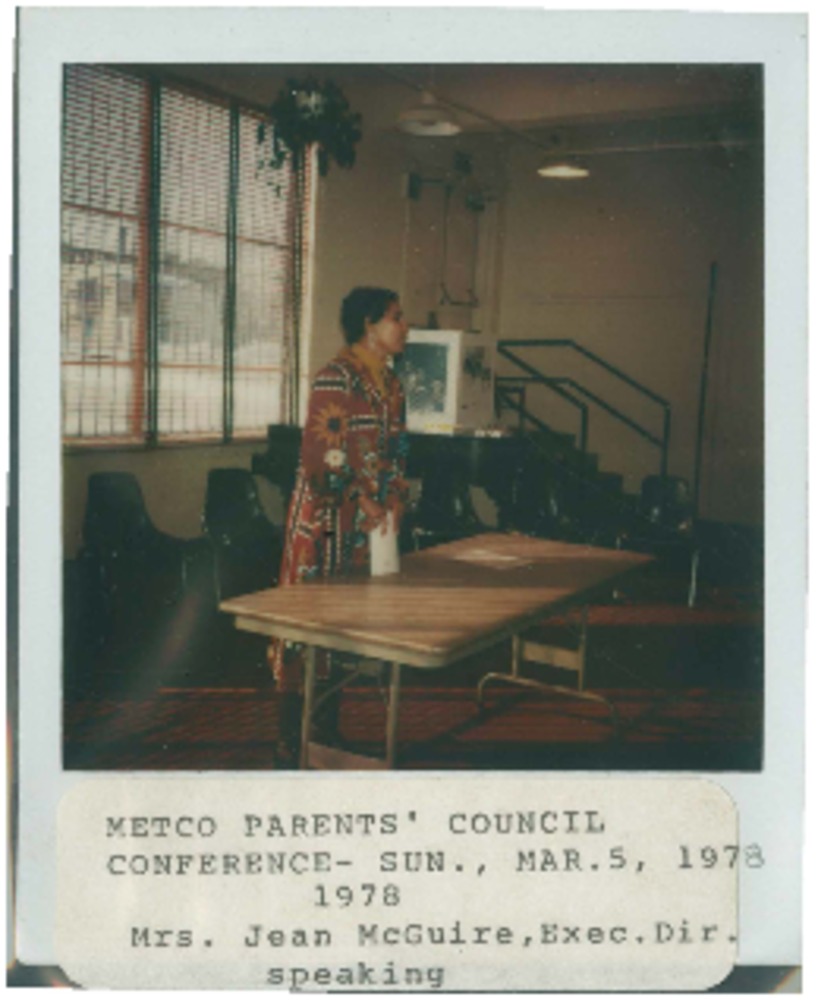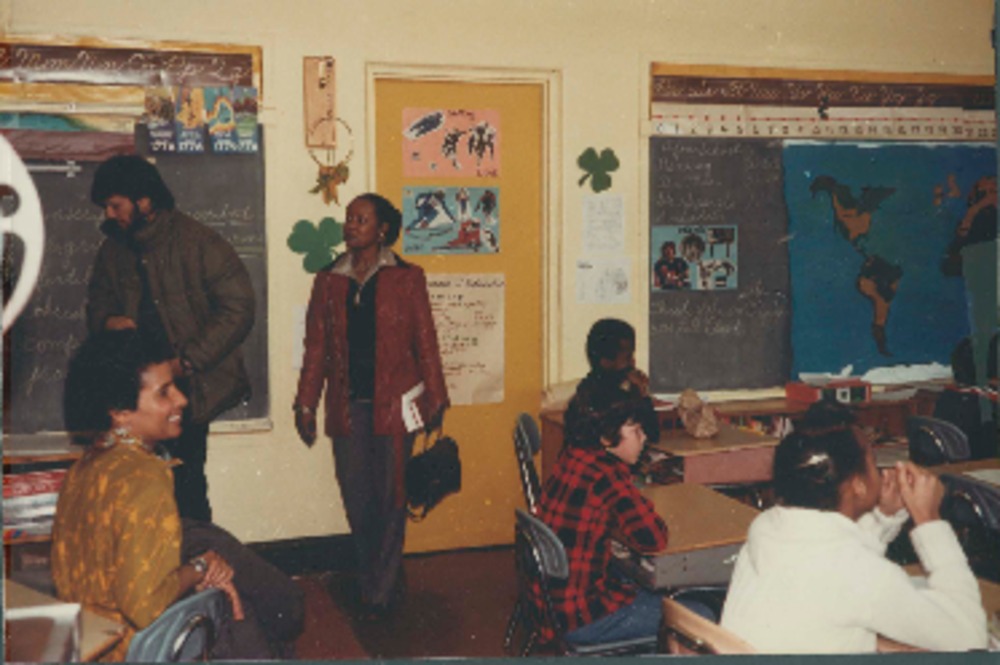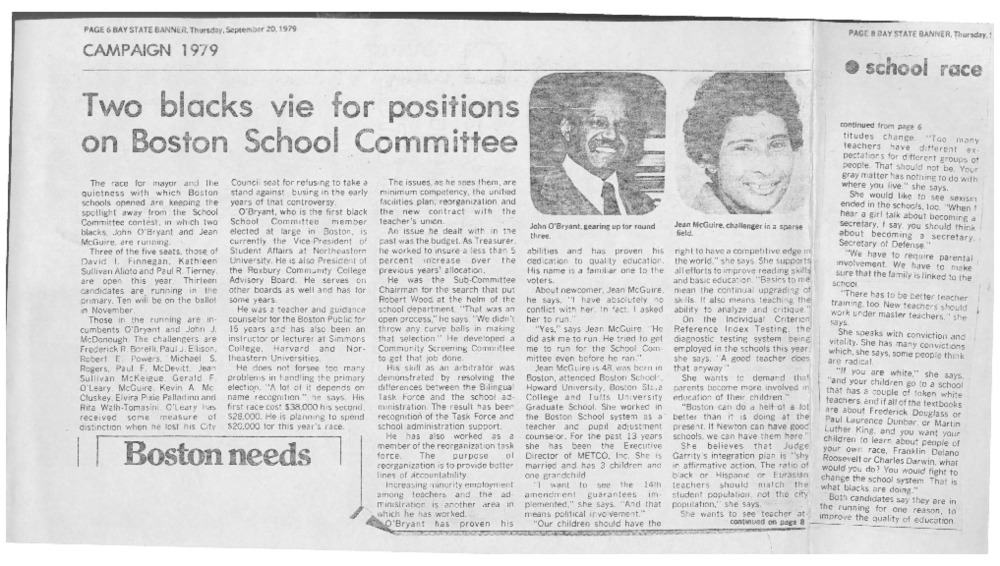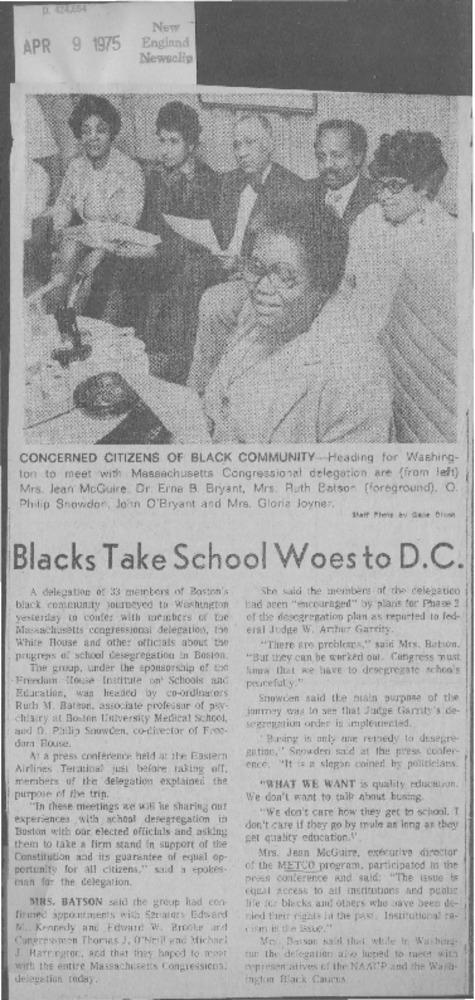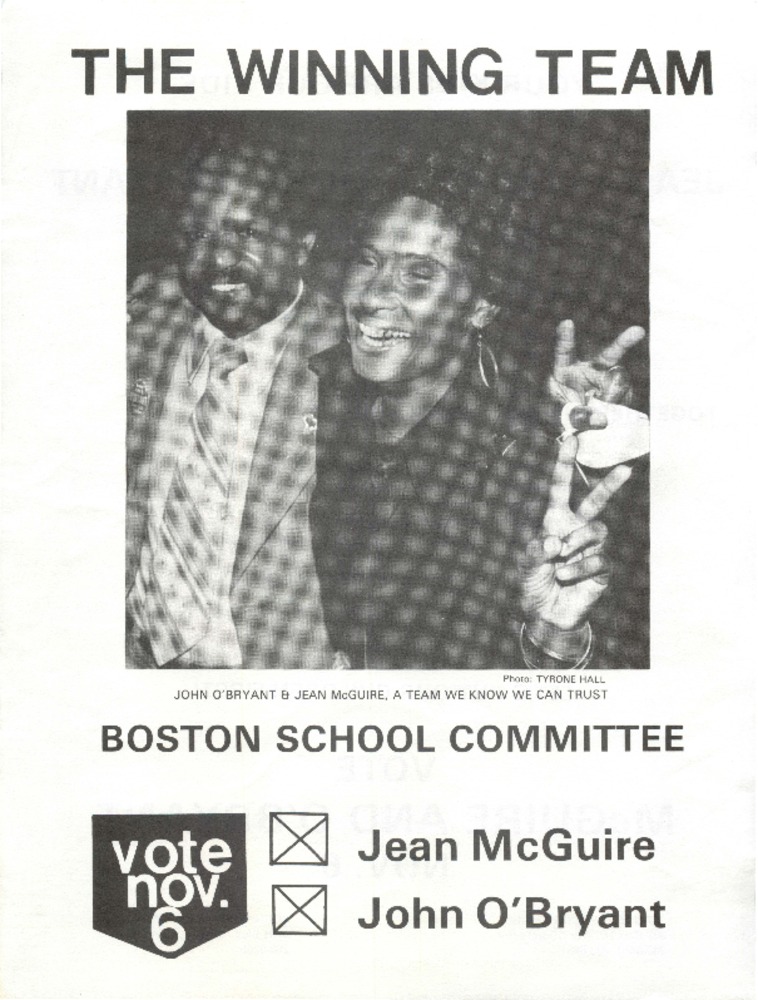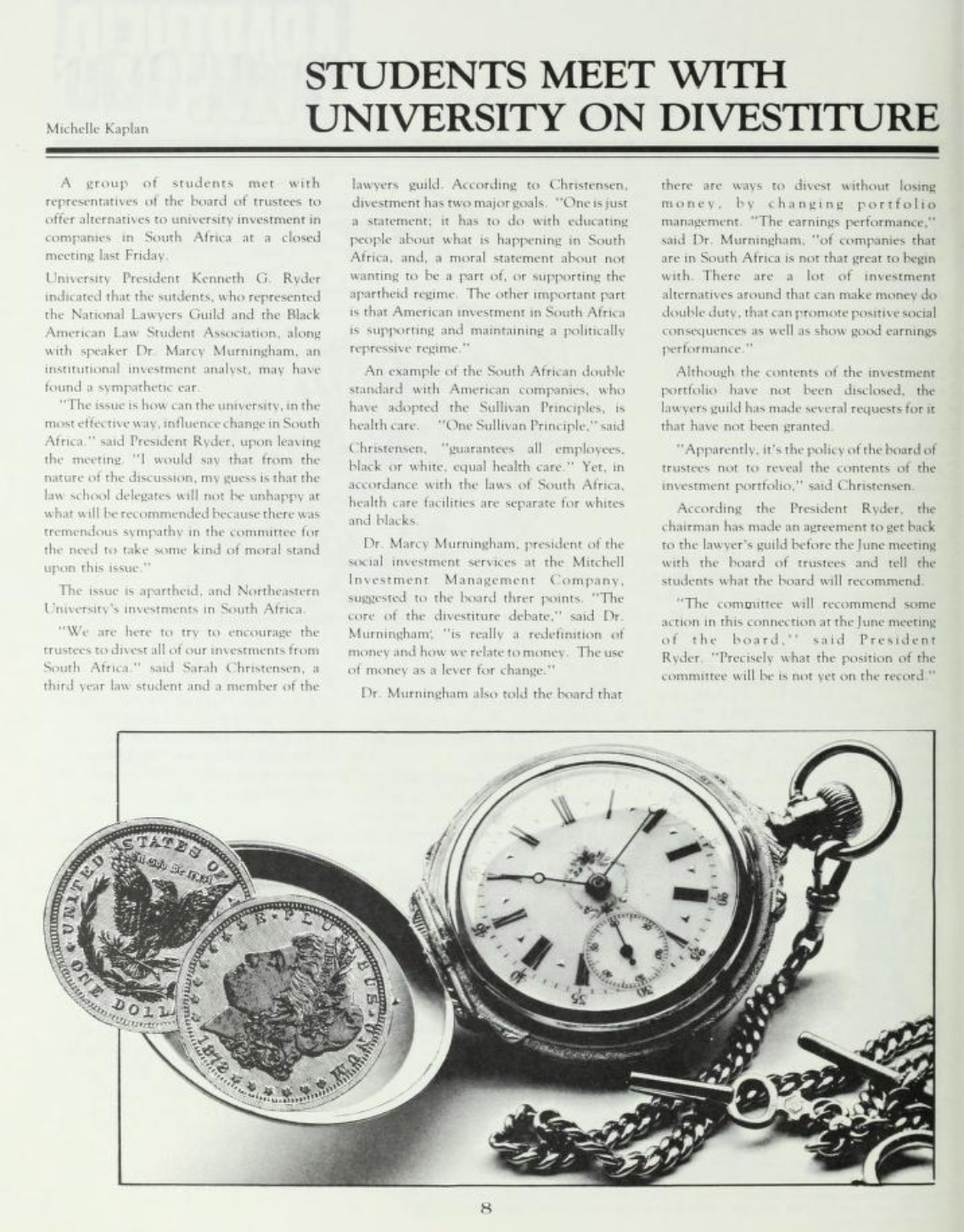Background
Jean McGuire grew up in and around Boston, attending the public schools of Brookline as one of the only Black students in all of her classes. She experienced racism in many different ways, from being accused of plagiarizing an essay she had written in the 9th grade, to being told “everyone knows coloreds can’t write poetry.”
After the passing of her grandmother, McGuire moved to Washington, DC and attended Dunbar High School, which at the time was all Black due to segregation. There, in contrast to her experience in Boston, McGuire found role models among the Black teachers who taught her about Black writers and artists and who pushed her to excel. From there, McGuire attended Howard University, but eventually came back to Boston after a lack of opportunity in DC. She finished her degree in education at Boston State College in 1961, seven years after Boston schools were ordered to desegregate. McGuire taught at the Louisa May Alcott School for two years, and then worked for Boston Public Schools as the first Black Pupil Adjustment Counselor, working with students who had emotional and environmental difficulties in districts all around the city.
In 1966, McGuire helped found the Metropolitan Council for Educational Opportunity, otherwise known as METCO. METCO is a voluntary school desegregation program that buses students of color in Boston to predominantly white schools throughout Boston suburbs, in order to receive better education from well-funded schools. Jean McGuire became the executive director of METCO in 1973, and remained the director until 2016. During her 43-year tenure, she was known as a fierce advocate for METCO students, who generally received better educational opportunity through their participation, but at times also faced racism, violence, and isolation in overwhelmingly white suburban spaces. McGuire also advocated for Black educators, calling for the need for racial and community representation at all levels.
McGuire is also known for being the first Black woman on the Boston City School Committee. She was encouraged to run by her friend, John O’Bryant, who was the first Black person on the School Committee. In her positions on the school committee and as the director of METCO, McGuire was known for her tireless commitment to the students she served. Beyond her work in Boston, McGuire’s career also had national impact: in 1975, she went to Washington with a group of 33 Black Boston leaders to discuss school desegregation with the Massachusetts Congressional Council and the White House.
Jean McGuire’s Speech at Northeastern
In 1985, Jean McGuire was invited to speak at the African American Institute’s annual Unity and Awards Banquet. Established in 1972, the Unity and Awards Banquet was an opportunity for African American students to be honored for their achievements, leadership, and contributions to the African American community on campus. Previous speakers have included Julian Bond (co-founder of SNCC and chairman of NAACP), poet Sonia Sanchez, and former MIT professor and politician Mel King.
McGuire was likely tied to Northeastern through her connection to John O’Bryant, who was also the Vice President of Student Affairs at Northeastern during that time.
During her speech, McGuire spoke fiercely and confidently, reminding the students of their communities’ realities and needs, and calling on the students to take action, on the behalf of their communities. In line with her interests and background as an educator and public schools advocate, McGuire specifically spoke out on her audience’s responsibility to African American children, saying, “People who don’t get upset that our kids aren’t taking math and calculus – it’s time to be upset!”
Throughout the speech, McGuire’s refrain was “Are you ready?” She named issue after issue, and asked if the students present were ready to take them on. “Millions of African-American children need a home,” she said. “Are you ready to take care of them?” Through her conviction of the need for students like those at the African American Institute to enact change, McGuire also empowered her audience to take on positions of power, in order to advocate for their community. “You better change not only the complexion, but the [type] and quality of the candidate that runs for school committee and city council and mayor,” she said. “I am serious as a heart attack!”
McGuire also touched on the importance of cultural centers and studies. “That’s what every African American Institute, every African American Studies department, every class has as its major focus, that people of color can live in peace.”
Jean McGuire’s Unity & Awards Speech Transcript
Unity Awards Banquet 1985
Jean McGuire
Transcribed by Alison Hu
Note: Timestamps are from the original video file. Ellipses indicate inaudible excerpts.
5:25
“I am well aware that I came to speak… It is a tribute… I am deeply honored to be invited to [discuss] the study of our experience as people of color in this country. In particular, this century that is close to my heart, and what is going on now at Northeastern and other universities around the country
6:00
…the discussions that form our activities and actions were deliberation around the issue of racial …that takes place is going to determine the directions that colored people take because this is… country…and all those that attend here…and that is a tribute to the greatness of the vision that allows education to continue for all of us. That is always the goal. To make certain to continue for those who come behind you and for those who are your peers. You are the chosen few…Not all of us have been to college.
7:00
Many many more people…high school…It was unusual to go to college in 1948. …There are too many things surrounding the political process, which may turn around…and how it started…And if you are not involved in that process, if you don’t help to stop it, much of what you see on this stage, for instance, the….will not be something that continues easily. Not only…but also the mechanisms by which some of us came to be on faculties, and boards of directors…needs to be continually refurbished, upgraded, and…
8:00
I’m talking about Black power. The human [use of] power, which is not because of our African American spirits. I’m talking about….The human use of power. There is no magic in being Black. No magic… There’s no magic. We are all human beings who moved around….Richness and experience that we take from one another that we need in order to make proper decisions, or we become isolated and make improper decisions. When we become isolated, when we lose sense of touch with our roots, when we forget who we were meant to become, when we forget who we really are…then we make the kind of decisions that hurt our people. And those of you who fear…you have your talents…
9:00
What we need now is to…universities…for businesses, for our school districts…From that community to the diaspora around the world, where you go for vacations or read about on the front page of papers….And know that it touches you in all that you do. The decisions that you make, however small they are, ripple out and touch upon the shores. So we never…what we learned…
10:00
Every course you take…sometime in your life, every ability you have to make friends, to negotiate, to withhold judgement, to teach, to learn from one another, and yes to love, which is the ultimate direction of the human endeavor will…the university which will prepare you for the public schools. So when you leave this university, when you take the awards and hang them on your wall, when you remember the accolades you received from your peers and from your teachers, remember that for one thing – that’s to make you grow a part of the place from where you came, put those awards, put those [something] to work. There is nothing else more important than work. That’s why when you are unemployed you are so devastated. That’s why our communities..
11:00
‘Cause without the work you are all hailed in this society as nothing. Politics…with all their needs…from ourselves and each other, even to the extent…or antique feminism or antique Blackism and all the ills we have inherited from the time…We have to resist being sucked into the [male spawn] that is negative. We have to support that which explains our experience, that which…defines and determines what our eyes really see. Not what the media tells us, but what our eyes and our physicians and our writers analyze for us.
12:00
We have to pass that on…to those who live with us so that…because the word is fighting the sword now as it ever was. It’s no happenchance that the first things that a dictator does, is to eliminate the artists, the newspapers, the journalists, the musicians, the….Those people who tell you what it’s really like. They must be silenced. Never become part of the silences. Never be afraid of that discussion of men and women…that must take place before…without it, we don’t have…so don’t be afraid of conflict. Don’t be afraid to conduct your rooming…That’s what you cram in class for, that’s what you study all night for, that’s what you cram for,
13:00
That’s what you do research for that’s what you fight for….that’s what you took pictures to show. That’s what you performed for. So you can use it to make certain that people eat, that they have that which is necessary for the spirit, that they have that which is necessary for good health, that they have a roof over their heads, they have opportunities to learn just like you did. And you will be that new citizen that understands the role of government, and is willing to beg for it. Our taxes institutions…They paid..to take care of day care centers…
14:00
that provided the kind of interest rates that people can afford to save to buy a house…We complain about so much. So much. We sit surrounded by cleanliness in this country and we complain about what we don’t have. We can make choices about what we’re going to eat, we open the door of our refrigerator, we turn on the faucet…We can go to the library, make a choice…We can make a choice about what to wear. We can walk to work or school. We can take trams or public transportation. We feel protected by the armed forces.
15:00
We turn on our televisions and radios. We have so much complaints on…to put that in perspective into where we are in relation to the rest of the world so that 20 million years from now, we may still be around. There will be peace in the world. There will be scarlet skies, clear, where music abounds and birds still sing. And the ocean is clean, and you can travel in safety anywhere you want in the world. Do you know that people go to bed hungry, that’s your task. There is not one person…who is graduating from this university who will think, “I don’t know what I want to do”. Turn any direction you want and the world will place it before you, begging to be done.
16:00
Millions of African-American children need a home. Millions of men and women who subsist in our jails – yes, middle class men and women are in our jails right around here, ten miles away on…We need to understand why…so the next generation won’t follow them. Are you ready? are you ready to take in some of these children who need foster homes? We complain when our children aren’t put in African-American homes. Are we ready to take care of them? Are we ready to save the African-American child from the…because they buy…Are we ready to save the African-American child from television, from too much salt, from the too much sugar, from too much…from too much idle time,
17:00
from too much lack of skills, lack of reading, lack of chances, lack of jobs? Are we ready to save them? Are we ready to form coalitions? Are we ready to get political power? Are we ready to band together with those progressive in their actions? There are positions to be supported. There are artists to be supported. There are musicians to be supported. There are magazines to be supported. It is to our great discredit that we put the term “first world.” There’s enough subscriptions sold that…It isn’t because we don’t have too many editors…That we subscribe to those things that we don’t need, we subscribe to what we want to buy and look like – all those things that our mind needs to help us
18:00
turn away from the needs of the world. We do not…40s and 50s. To subscribe and support a magazine that is a first class…of our politics and analysis of our condition…that says what we feel our situation is, not how others interpret us. That is your major task: to define who you want to be defined as, not as others think they see you. If you do that through words and music and art and…and yes, newspaper columns.
19:00
Can which one… Who’s going to follow after King? Who’s gonna follow in the marches? Who’s gonna follow Shirley Chisholm, Michael Jordan, Curtis…, John…? Are you ready? Are you ready to pass up Black galaxy and dynasty all that backflap? that passes for the use of your time? The lies…Are you ready to cast that aside to get goin’? If you are, you will use every skill you got at this university. You will write and you will organize and you will get people registered to vote. And you will define the issues and you will clarify them and you will work…Instead of watching other people make love and make money and make war, you will do so – and make peace.
20:00
I challenge you to do that. That’s what every African-American Institute, every African-American Studies department, every class has as its major focus. That people of color can live in peace with those who…Yes we work, until we…otherwise…We gave this planet life and it will be upon your souls, your strong shoulders, your keen minds, your…and your willing hands to make sure that that life sustains itself until the year 2000. That you somehow put shackles on that ego…Yes…certain country…
21:00
… Are you ready for peace? Are you ready to go to war to make peace? Lay down your short sword and shield…until that time comes, you better be ready to fight to maintain what little power we have to maintain our rightful place on this planet. To make certain that the young people who are epitomizing…Don’t you be the kinds of Black Americans who talk about not wanting to spend your money on people on welfare. That is a cop out….civil rights. Don’t you be one who turns down the victim instead of going after the victimizer.
22:00
Don’t you be the colonizer. Don’t you be the handmaiden or the handyman of colonialism work in Roxbury or in Washington, D.C. or Nicaragua or Jamaica or Nigeria or South Africa…In your lifetime it will be free. Hopefully in the next 10 years it will be free. Will you be one who speaks up for Transafrica against the people who come against our homeland?
23:00
…chains…Are you ready to take a stand for freedom? Are you ready to enlist in the body of politic for your services? When I ask you, ‘Who will become a candidate for mayor’, I am serious! I have many of my friends who are not people of color who don’t give a second thought to running for city council, school committee, mayor, …, you name it, they are ready! Doesn’t matter if they are educated or not. In all the whiteness and whiteness and nothing else…Whiteness and Blackness so that…as much as they pass issues of access…
24:00
If there’s one, one answer we have, out in Philadelphia, is that you don’t ask the hard questions that go beyond…and the color of our skin…we all need…A baby dies who’s Black, a baby dies who’s White, a baby dies. And that’s the issue…Are you ready to incorporate the sanctity of life? When you sing about Jesus, the church, redemption, and we practice, “Thou shalt not kill”? Use goods and services…Are you surprised by…? We shouldn’t be. Are we surprised by…? We shouldn’t be. Are we surprised by…? We shouldn’t be! What have we done to stop it?
25:00
What are we going to say about our actions that’s…No one else can know how hard it is to start something…or lose weight or change your grades. And you know how hard it is for children. Not only do they say what we say and they do what we do. They are our mirror. So we shouldn’t be surprised by anything we’ve seen by our young people. They are ours. They’re not on Mars, they’re not in Moscow, they are in the good old US of A. And they are ours and they represent what we think is important. So if we want something implemented in our children than we have to do something. We need to take charge of their education. That means in the city of Boston you better change not only the complexion, but the [type] and quality of the candidate that runs for school committee and city council and mayor.
26:00
I am serious as a heart attack …They say that all the time in the media. We want for our children… Half of our children drop out of school before high school…Right here in Boston… Yes they are. Don’t think they’re not – they live on your street. They go to your church. Kids who we have failed, kids who we don’t prepare, who are complicated…
27:00
That’s what our kids get: they get the the gangs. The other kids – take a guess – they get what’s necessary to achieve. People who don’t get upset that our kids aren’t taking math and calculus – it’s time to be upset. How many have been in our schools? How many have been in our hospitals? How many have been in our daycare centers? How many have visited our prison in the last month? That what happens when…whether it’s Ethiopia or…there are hungry people. There are people who are hungry who…there are people who are hungry for people with integrity and caring…I hope in this story there are people to represent them in the public sector in the business world, in insurance agencies.
28:00
There are people who pass onto the next generation through private institutions like the church and museums and art studios and the media that which is important. That which says we’re a caring people. That we don’t sell things using our sexuality instead of the price of work. That we don’t sell things using the thin clear voices of children… That’s the ultimate betrayal of children…so that they can come against a means to an end instead of an end of themselves. Wonderful young people, their innocence is lost. We can change those things. Take every word here and add onto it because you will be here for the rest of your life. You will be ready for each other, ready for [rules], ready for computer programs which I hope you develop software for.
29:00
You will be learning for the decisions made, for the policies… I hope you will be on those boards…I hope many of you in this room will be here…Are you ready? How many of these are children? I beg you…Nobody wants to give them the time. You must give up… How many sit on those boards? You have to sit on those boards. Some of that you must have powers. There is no substitute for power. You cannot always go…for what you want. You have to be able to demand it as a right. John Glenn can’t handle it by himself. For every John, there’s twenty in this room. Shirley Chisholm is ready to take her place.
30:00
You must claw for what you want for what you need. Do that which now said is necessary. Ask the hard questions. Do the things that are maybe sometimes frowned upon because you’re putting your finger on the spot that needs to be…Don’t defer to other people’s goals. Set your own, then follow the collective. The individual isn’t as fine…take care of yourselves…That’s not enough. You can’t pave your streets. You can’t plow your own streets. You can’t drive your…expressway…You can’t put out your own fires. You can’t run up your own university. You do that in concert with others.
31:00
So most of your life is going to be with activities that involve other people, many of whom you won’t like. But that’s the reality of the world and that’s why much of what goes around, getting… politics of Northeastern University…touches the politics of South Africa, touches the politics of the state house, touches the federal government. Touches the expansion of our university into the neighborhood. There is no area of your life where you will not be involved in politics, including sexual politics. So you might as well be ready to deal. Because that’s why you’re here, as a part of the African American Institute. Are you ready for the future? I don’t know… I don’t know what part of the world you may choose to reside in or be called to serve your country…
32:00
…Offices of color. As much as those of us cry war, there has to be a military to…people change. And we need to be there. I hope you’re also soldiers who are ready. Ready to…before you start so that you understand what took place in the 40s…Japan, Grenada, San Antonio… You’re needed, so wherever you go, I expect you will do our Northeastern University well. And do the African American experience honor. Those who went before you. People’s names who are remembered…Sojourner Truth. Harriet Tubman. Martin Luther King…
33:00
Don’t play what they represent. I would like to conclude with some words from what I’ve said about…post…Whose writing and the writing about that artists, poets, dramatists, novelists, you should have in your personal libraries, that each month buy a book that is by or for people of color. Distribute that literature and art that is an analysis, because if you don’t you wont’ be Black. I feel that these words written many years ago are very good for us now. I don’t know how many of you know “The Sermon on the Warpland”by Gwendolyn Brooks.
34:00
these are great words and I put them in honor to you…here on this platform.
“The fact that we are Black
is our ultimate reality.”
– Ron Karenga
“The Sermon on the Warpland”
And several strengths from drowsiness campaigned
but spoke in Single Sermon on the warpland.
And went about the warpland saying No.
“My people, black and black, revile the River.
Say that the River turns, and turn the River.
Say that our Something in double pod contains
seeds for the coming hell and health together.
Prepare to meet
(sisters, brothers) the brash and terrible weather;
the pains;
the bruising; the collapse of bestials, idols.
But then oh then!—the stuffing of the hulls!
The seasoning of the perilously sweet!
The health! The heralding of the clear obscure!
Build now your Church, my brothers, sisters. Build
never with brick or Corten nor with granite.
Build with lithe love. With love like lion-eyes.
with love like morning rise.
with love like black, our black—
luminously indiscreet;
complete; continuous.”
“The Second Sermon on the Warpland”
This is the urgency: Live!
and have your blooming in the noise of the whirlwind.
Salve salvage in the spin.
Endorse the splendor splashes;
stylize the flawed utility;
prop a malign or failing light–
but know the whirlwind is our commonwealth.
Not the easy man, who rides above them all,
not the jumbo brigand,
not the pet bird of poets, that sweetest sonnet,
shall straddle the whirlwind.
Nevertheless, live.
All about are the cold places,
all about are the pushmen and jeopardy, theft–
all about are the stormers and scramblers, but
what must our Season be, which starts from Fear?
Live and go out.
Define and
medicate the whirlwind.
The time
cracks into furious flower. Lifts its face
all unashamed. And sways in wicked grace.
Whose half-black hands assemble oranges
is tom-tom hearted
(goes in bearing oranges and boom).
And there are bells for orphans–
and red and shriek and sheen.
A garbage man is dignified
as any diplomat.
Big Bessie’s feet hurt like nobody’s business,
but she stands–bigly–under the unruly scrutiny, stands in the wild weed.
In the wild weed
she is a citizen,
and is a moment of highest quality; admirable.
It is lonesome, yes. For we are the last of the loud.
Nevertheless, live.
Conduct your blooming in the noise and whip of the whirlwind.
Interview with Dean Harris
Legacy of McGuire at Northeastern
Richard Harris, the Assistant Dean of Academic Scholarship, Mentoring and Outreach and the Director of the NU Program in Multicultural Engineering (NUPRIME), was a student at Northeastern from 1984 to 1989, and remembers Jean McGuire’s impact on him, and other Black students on campus.
As a young man coming from Brooklyn, Dean Harris described feeling a “sense of connectedness” to the Black neighborhoods of Boston. At Northeastern, Dean Harris found community at the African American Institute, which he described as a “gathering place” where he would see Jean McGuire and other elders regularly. “I remember her being a presence on campus back in those days,” he recalled. “Jean McGuire, John D. O’Bryant, Ellen Jackson, Mel King, and others like that were always coming through and being a mainstay and helping us understand the political issues.”
It was from sitting at the feet of these leaders and activists, that Dean Harris and other Black students learned how to lead. “For many of us,” he explained, “I think we were the [beneficiaries] of individuals like her who were able to give us a sense of what it means to give back, what it means to be a servant leader and developing that servant leadership kind of mindset, and sometimes being unsung, underappreciated, and sometimes even questioned by your own…I think Jean really embodied that.” According to Dean Harris, their exposure to the organizing meetings held by elders at the Institute and guidance from those like Jean McGuire helped shape their own activism as they organized to protest apartheid and advocate for divestment from South Africa.
When asked about the continuing legacy of Jean McGuire and other elders from that time, Dean Harris spoke about the importance for today’s generation to understand their history, saying “I think we don’t do a great job of telling our stories, of identifying our heroes and sheroes, making the connections fully understood of the people who have come before you. So for me, it’s always important to make those connections for [students].” Dean Harris continues to carry out Jean McGuire’s legacy at Northeastern today, in his work as the dean of engineering minority admissions and in his mentorship of Black students in the Black Engineering Student Society.
Bibliography
Accusations of Racism in Suburban Schools. 1978. Photo of Sun Chronicle article. Metropolitan Council for Educational Opportunity, Inc. Records. Boston.
Devall, Cheryl. “McGuire Makes Bid for School Committee Post.” Bay State Banner (1965-1979), Jun 07 1979, p. 3. ProQuest. Web. 19 Apr. 2018.
Ebert, Alan. “Jean McGuire: Working and Fighting To Save Our Children.” Essence Magazine 1973: 72-73, 95-98, 122-130. Print.
Harris, Richard. Interview with Dean Harris. 2018. in person.
Hiring Practices ‘Disgrace,’ Says METCO Head: McGuire Charges Racism In Suburb Schools. 1978. Photo of Boston Herald article. Metropolitan Council for Educational Opportunity, Inc. Records. Boston.
Kaplan, Michelle. Students Meet with University on Divestiture. 1985. Article. Onyx: The Black Student View at NU.
McGuire, Jean. A Statement. 1977. Text. Metropolitan Council for Educational Opportunity, Inc. Records. Boston.
McGuire, Jean, and Steven Shaw. Concord/Carlisle High School Participation in METCO. 1978. Memo. Metropolitan Council for Educational Opportunity, Inc. Records. Boston.
McGuire, Jean. FY ’85 METCO, Inc. Review Team Report. 1984. Memo. Metropolitan Council for Educational Opportunity, Inc. Records. Boston.
McGuire, Jean. Interview with Jean McGuire. 1989. in person.
The Onyx Informer. 1985. Web. 4 Apr. 2018.
Thompson, Amanda. “Jean McGuire Remembers METCO Then and Now at Cohasset MLK Day Breakfast.” Cohasset Mariner 2017. Web. 19 Apr. 2018.
“Unity and Awards Banquet.” African American Activism and Experience at Northeastern University. Web. 19 Apr. 2018.
Vaznis, James, and Andy Rosen. “Longtime Metco Director Says She Was Forced Out.” Boston Globe 2016. Web. 19 Apr. 2018.

